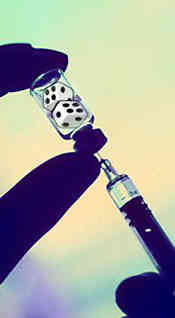|
Day One: The Injection
 January 11, 2001
January 11, 2001
"Okay, note the time," Dr. Silberstein said as he held the syringe in place.
One of the two other white-jacketed doctors standing near my feet looked at his watch.
"It's 12:17," he announced. Then he jotted something onto the clipboard he was holding.
"Here we go," Silberstein said as he slowly pushed the plunger, injecting an unknown substance into a vein on my left arm.
There was no turning back now.
I had officially begun a clinical trial.
A mere two months earlier, the mere words "clinical trial" made my skin crawl. Even though I had terminal prostate cancer and friends had urged me to consider one, I had vowed never to volunteer. After reading about clinical trials, all I could remember was phrases like "to test the safety" of a drug or procedure and I didn't want to be a guinea pig and suffer unknown side effects on the mere hope that I would benefit. It was a roll of the dice that I didn't want.
But now, here I was, calmly lying on a padded gurney in the Department of Nuclear Medicine at the University of Cincinnati, a ready volunteer. The upper part of my body was slightly elevated. My extended left arm already had an IV line into the vein, dripping a saline solution that Silberstein had just tapped into with the new needle. Somewhere in the background, a song from The Doors was playing softly but my attention was on the procedure.
"We're halfway there," Silberstein commented. I looked down at the syringe as he pushed it again slightly and then paused. I had already read that it took a minute. "How are you doing?"
Fine, I said, perhaps with a slight smile.
I was. I was also surprised how calm I felt.
I took a deep breath, trying to know what I was getting but not even Silberstein knew. It was what they call a double-blind study. Only one doctor somewhere in the building knew what was in the vial. It was a common procedure in clinical trials. Some would get the drug and others would get a placebo, so they could measure effectiveness.
In my case, I had a two out of three chance. One group would get the placebo. The other two groups differed only in the dosage. Half would get a double-dose. Right now, none of us knew and all I could do was wonder what group I was in. The placebo group would get a common injection of radioactive material used for imaging. The other groups would get the "real stuff," differing only in dosage.
I looked back at the other two doctors watching and then to the young man standing several feet behind and to the right Silberstein. He was holding and watching a black box in front of his chest. No one had said but I knew what it was: a Geiger counter. Even though no one knew what I was getting, the safety procedures taken assumed it was the test drug. Him and that black box he stared at were the only ominous aspect.
"Okay," Silberstein finally said. "We're done."
I looked over. He withdrew the syringe and it went back into a glass cylinder and then he placed it into the dirty gray-green colored lead box they both had come from a few minutes earlier.
"And not a drop spilled," he added. He finally crimped off the IV, put a piece of gauze over the needle and withdrew it, covering the entry with a piece of tape.
He stepped aside and the young man with the black box took his place. He waved the box slightly. Then he offered me the end of a metal tape measure.
"Hold onto this, please," he said matter-of-factly.
I held the tip with my right hand as he measured out about 20 inches between me and the black box as he looked down at it.
"You checking to see if I will glow in the dark?" I asked with a slight laugh.
"Standard safety measures," one of the doctors said. It had already been explained to me but the moment seemed to call for some sort of levity.
The young man finally looked up. "Okay," he said with a smile. "You can let go. We're fine."
He took his tape and withdrew.
"Well, that's it," Silberstein said with a smile.
Somewhere Jim Morrison continued to sing.
|
|